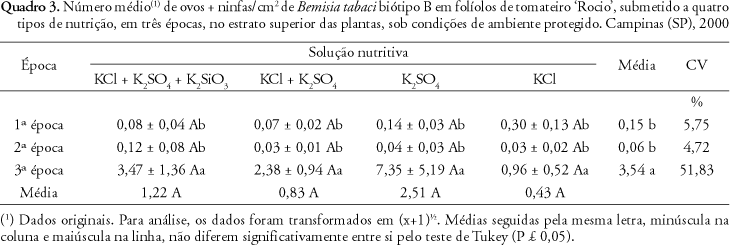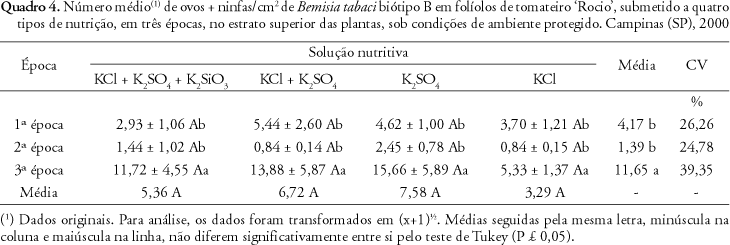Bemisia tabaci (Gennadius) B biotype (silverleaf whitefly) is considered the most important whitefly species harmful to agriculture. It is responsible for great trade losses and lower market prices, mainly for tomatoes. Among the environmental factors, the mineral nutrition can influence the expression of plant resistance to the insect. The objective of this work was to evaluate the infestation of silverleaf whitefly on tomato plants fertilized with different sources of potassium in nutrient solution. The experiment was carried out at Campinas Experimental Station, IAC, from December 1999 to May 2000. The tomato hybrid tested was Rocio, cropped on slabs with commercial substratum, in protected cultivation. Four nutrient solutions with varied potassium sources: (KCl + K2SO4 + K2SiO3; KCl + K2SO4; K2SO4 e KC1). There were utilized three evaluations of eggs plus nymphs number at 15, 30, and 45 days after the whitefly introduction in the greenhouse. It was also evaluated yield and quality of fruits. The data showed that the different sources of potassium did not affect neither the B. tabaci B biotype infestation, nor the fruit yield and quality of the tomato hybrid cultivar used in this study.
Lycopersicon esculentum Mill.; Insecta; Hemiptera; Aleyrodidae; nutrient solution; silverleaf whitefly; Bemisia argentifolii

 Effect of potassium sources in Bemisia tabaci B biotype (Hemiptera: Aleyrodidae) infestation and in tomato fruits characteristics in protected cultivation
Effect of potassium sources in Bemisia tabaci B biotype (Hemiptera: Aleyrodidae) infestation and in tomato fruits characteristics in protected cultivation



